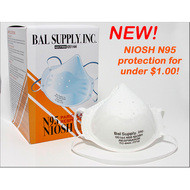Posted by The Safety Emporium Support Team on Mar 29th 2021
Don't Trust Web Sites That Recommend KN95 and Cloth Masks
We've seen dozens of tech sites, syndicated media companies, mommy blogs and others create posts titled along the lines of "The Best KN95's" which feature links directly to those products on Amazon an
…

